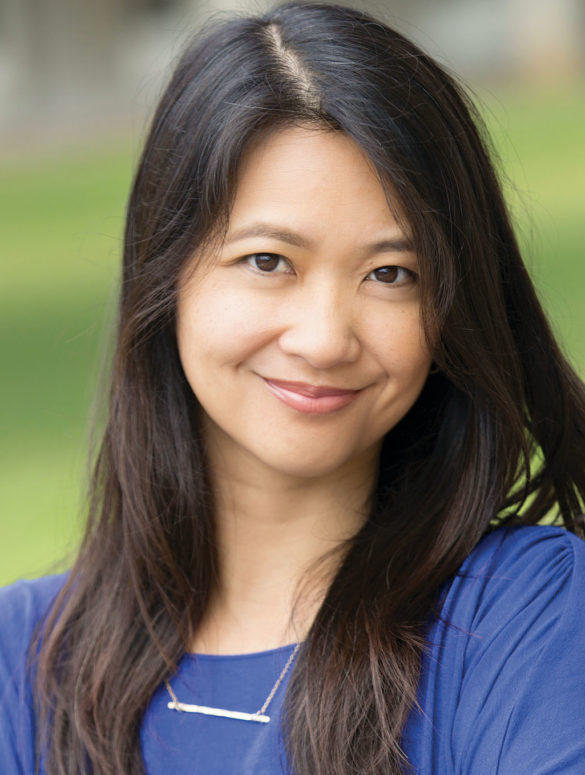Kimberlee Bortfeld ’95 Bassford’s films probe some of society’s toughest issues through the lens of approachable topics – an unstoppable female wrestler, a popular politician, a squad of pre-teen cheerleaders determined to compete on the national stage. “I explore things I have a question about,” the award-winning documentary filmmaker says.
The majority of her work turns the spotlight on strong women – particularly women of color. “I didn’t intend that when I started out, but those are the stories I’ve been drawn to,” she says. Bassford recognizes a direct link between women’s roles in media and their treatment in the real world. “Women are underrepresented in children’s literature, television and films,” she says. “It goes back to – do we value girls? Do we value women?”
Telling women’s stories on the big screen is her way of encouraging change. She believes shining a light on women who push barriers can inspire not just girls, but boys and men too.
By her own account, Bassford got a late start in filmmaking. After graduating from Punahou, she earned a psychology degree at Harvard, then returned to Hawai‘i to work in city government and plot a career path. As she evaluated her skill set and goals, filmmaking kept rising to the top of the list. She landed a few jobs at local production studios, editing karaoke videos and assisting with a major film on Maui. The hook was set. She enrolled in the graduate filmmaking program at University of California Berkeley’s journalism school.
Judging by her thesis project, this was a wise choice. Bassford’s short documentary, “Cheerleader,” won a Student Academy Award, and as part of the Kodak Emerging Filmmaker Showcase, screened at the 2005 Cannes Film Festival. The 24-minute film also aired on HBO Family.
The film follows a California squad – some of the nation’s youngest cheerleaders – as they leap and cheer their way to the national championships. Bassford was once a cheerleader herself. Her Punahou varsity team also went to national championships. While cheerleading was a big part of her life, she wondered why squads, comprised mostly of girls, cheered mostly for boys’ teams. “Later on, identifying as a feminist, I wanted to explore gender and sexuality and what we assume about girls and women through this fairly mundane, ubiquitous activity,” she says.
After the success of “Cheerleader,” Bassford’s professor told her that if she was serious about filmmaking, she needed to move to New York or California. That wasn’t an option. She and her husband, Michael Bassford ’95, who teaches Academy science at Punahou, planned to stay in the Islands. “I knew I was going to have to go home to Hawai‘i and make it work,” she says.
In 2005, she opened her own production company, Making Waves Films LLC. Producing documentaries in the middle of the Pacific, far from the media hubs, presents special challenges and opportunities. “If you’re not in New York or Los Angeles, you are literally off the map,” she says. While industry executives don’t always take your work seriously, there’s a wealth of stories in Hawai‘i that haven’t been told, and really should be told by people who are from here, she adds.
Bassford’s first feature illuminated just such a story – the life of Patsy Mink, a young Japanese American who grew up on a Maui sugar plantation and became the first woman of color elected to the United States Congress in 1965. Mink famously co-authored Title IX, legislation that prohibits gender discrimination in education and athletics. Bassford approached Mink’s daughter and widower with the idea for a historical biography and spent the next four years raising a budget and piecing together hard-to-find archival footage. The resulting documentary about the ceiling-smashing Congresswoman aired on PBS in 2009, netted accolades at festivals nationwide, and won the audience favorite award at the Hawai‘i International Film Festival.
Bassford tends to alternate between historic biographies, like the Patsy Mink film, and observational documentaries, like “Cheerleader,” which unfold in front of the camera. A mix of curiosity and faith has led the documentarian to pursue one ambitious story after the next, investing considerable resources without quite knowing where each narrative journey will lead. “It’s really scary,” she says. “While filming, you don’t have control over where the story is going. It’s hard to trust that there will even be a story.”
So far, her instincts have proven true. Bassford spent four years in gymnasiums and stadiums following Teysha Alo, a freckled young wrestler and judo star bound for the Olympics. That adventure resulted in the 2014 documentary, “Winning Girl.” She traveled to Southern China to film the story of her great-grandfather, the family patriarch who first immigrated to Hawai‘i. And while producing three episodes of PBS’s “Meaning of Food,” she was able to introduce national audiences to the significance of taro – Hawai‘i’s staple food.
She appreciates the recent movements to promote racial justice and gender equality – issues she has been exploring on film for decades. “I hope stories that have been seen as niche before might have bigger audiences now, and a chance to break through,” she says.
Movies, after all, can serve as an important medium for education and empathy. “As a documentary filmmaker, you walk in somebody else’s shoes for a few years, and that’s what you want your audience to do,” she says.

